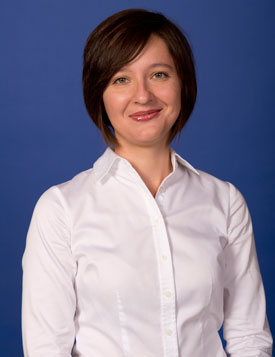Posted on December 16, 2013 by Wendy Frost

Headshot of Dina Krasikova
If your boss reminds you of Darth Vader, then you might be familiar with destructive leadership. Destructive leadership is like crossing over into the dark side. Leaders can be bad by either being ineffective in their jobs or by being intentionally harmful to their subordinates and organizations.
Destructive leadership is one of the many areas of study of Dina Krasikova, assistant professor of management. Professionally, Krasikova studies negative work relationships, but personally, the collegial environment in the Department of Management was one of the reasons that she joined UTSA this year following a two-year post-doctoral fellowship at the University of Nebraska.
“I chose UTSA because it was a place where high-quality research is valued, and I felt an instant connection with my colleagues. I wanted to work in an environment that fostered both personal and professional relationships,” said Krasikova, a native of Russia.
As an undergraduate, Krasikova became interested in how people behave in organizations. This curiosity led her to study leadership processes in the workplace. Recently, she and her coauthors published a paper in the Journal of Management on destructive leadership. Her research found that leader personality characteristics, subordinate behaviors and organizational context can influence the occurrence of destructive leadership.
Krasikova has also merged her passion for studying leadership with developing analytical tools that can be used to study relationships between leaders and followers in the workplace.
“A dyad is two individuals that maintain a relationship such as a boss and a subordinate or a pair of co-workers,” said Krasikova. “It is beneficial to study those relationships from the perspective of both members of a dyad.”
She and her former advisor, an expert in statistical methodology, have published a paper in the Journal of Applied Psychology that is essentially a tutorial for others to use to learn how to analyze and collect data from dyads.
“My goal is to make an impact on the field of organizational behavior by conducting research that clarifies leadership processes in organizations and by developing methods that can help researchers better study organizational phenomena,” said Krasikova.
And, ultimately, she hopes that her work can contribute to UTSA’s mission of becoming a Tier One Research University.
Please send your comments to: wendy.frost@utsa.edu


